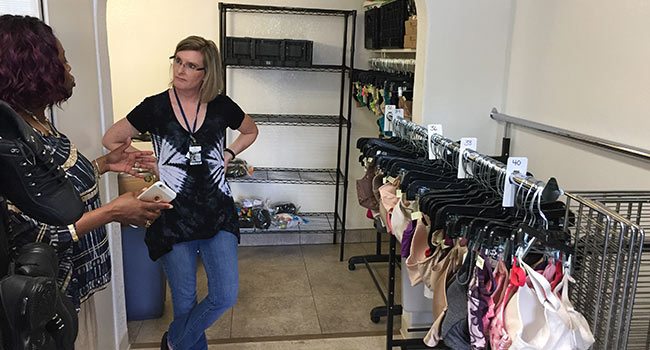When women cannot afford or do not have access to feminine hygiene products during their menstrual cycle, it can lead to serious health risks, and some shelters and pantries struggle to meet the demand for those products because of limited donations. Gynecologist Dr. Jane Rudolph said these risks include infection and toxic shock syndrome, among others.
“The big issue for homeless women is, when their menstrual cycle comes and they don’t have products, they may end up using things that are unsanitary instead,” Rudolph said. While working at Jackson Memorial Medical Center in Florida, she said she treated many women without insurance and homeless women who didn’t have access to menstrual products.
“I’ve had patients who used newspaper or even hay and grass to try and manage their bleeding,” she said. Rudolph said those patients are better off if they don’t use anything as an alternative to feminine hygiene products.
Support the Girls is an organization based out of Silver Spring, Maryland with volunteers all over the country. The group works to collect and donate feminine hygiene products, as well as bras, for shelters to help women in need.
In July 2015, Support the Girls was born after founder Dana Marlowe discovered there was a need for feminine hygiene products and bras at homeless shelters.
“A store associate told me about the issue while I was shopping for new bras,” Marlowe said. “I had never thought to donate those products before.”
Marlowe took to social media, asking friends for donations of old bras and boxes of feminine hygiene products. She said the response to her post was so overwhelming that at first she couldn’t keep track of the comments or donations.
“It spread like wildfire,” Marlowe said. “I originally thought that I would only collect donations for two weeks – I was wrong!”
Support the Girls received hundreds of messages from people who wanted to contribute by collecting donations in their own towns and cities.
“It led to the creation of our affiliates network,” she said. “Our affiliates are individual volunteers that act as liaisons for their city or community.”
Support the Girls now has 42 affiliates across the country. Marlowe said that she stays connected to the affiliates, and they connect to each other, during conference calls and through a private Facebook page. She said the organization has been active on social media from the start, and each affiliate has a Facebook page to stay active in their communities.
Corliss Seabron, the organization’s affiliate in Phoenix, said Support the Girls has collected and donated 525,000 menstrual products and 95,000 bras nationally since its start.
Seabron has been an affiliate of Support the Girls since June, when the organization came to her attention through a series of Facebook posts.
“I think it’s important because a woman shouldn’t have to choose between a tampon and feeding herself,” Seabron said. “There are alternatives to bras, but a woman’s period comes every month and there aren’t good alternatives.”
She has since donated nearly 4,000 menstrual products to local shelters throughout the Greater Phoenix area.
“At first, I was surprised that it was a need,” she said. “I think many of us have preconceived ideas that we should provide food and clothing to shelters, but we don’t think about the personal needs of women. People just don’t think about something that intimate or the expense of feminine hygiene products.”
Seabron said Support the Girls’ collection process may vary with each affiliate, but it is common to work with a local business to determine a drop-off point where individuals can leave their donations for the affiliates to pick up.
One of the challenges Seabron said she faces is that it can be difficult to establish those drop-off points, but that, “it never hinders our work.”
Seabron currently has a donation box located at Tempe Yarn and Fiber, a local craft store in Tempe.
Store manager Amanda Neal said after hearing about the cause, she offered Seabron an opportunity to talk to customers and collect donations at an event hosted by the Tempe Yarn and Fiber in March.
“People dropped off feminine hygiene products and bras, and we also raised money to buy more of those products,” Neal said.
She said information about Support the Girls and the donation box can be found on the store’s website. Neal calls Seabron to pick up the donations when the box is full, which has been more frequently than she first expected.
“Our customers have been really receptive to it,” Neal said. “It’s not a huge box, but we are collecting quite a bit and we are constantly giving Support the Girls new supplies.”
Neal said the decision to have a donation box for Support the Girls at Tempe Yarn and Fiber wasn’t a hard one because the store focuses a lot on volunteerism in the community.
Seabron said that her goal has been to focus on bringing the donations to smaller shelters and local organizations because it’s, “Harder for smaller places to get the support they need.”
On April 13, Seabron delivered a donation of 1,000 feminine hygiene products to Tumbleweed, a resource and housing center for homeless youths from the ages of 12 to 25 in Phoenix.
Donations of these products are rare at Tumbleweed, and donation coordinator Kristin Harris said the center was, “Desperately looking for donors to collect tampons and pads.”
“We are so super excited, this is always a need for us,” Harris said on the day the donations arrived.
Harris said out of the 280 clients that might be living within Tumbleweed’s housing complexes about 40 percent to 45 percent are women.
“The idea of running out of feminine hygiene products scares me,” Harris said. “If a client ever comes to us when they are getting their period, and we can’t give them enough to get them through the week, they might slip back into using newspaper, coffee filters or other unsanitary items.”
Harris said when her former suppliers started to dwindle, she went looking for new donation partners. She specifically sought those who could supply feminine hygiene products and came across Support the Girls. Harris connected with Seabron to request assistance and form a relationship with the organization.
“I also needed bras, and online it said ‘and feminine hygiene products,’” Harris said. “I thought ‘she’s a Godsent!’”
The day Seabron brought the collection of products to Harris at Tumbleweed was the first time the pair met in person.
“The motivation for me personally is that I always want to do more,” Seabron said. “When I bring donations I think, ‘Oh my gosh, there is a need there and I’m so happy I was able to meet that need, but that was only one need,’ and there is always more.”
Support the Girls’ rapid momentum and expansion since its start is something Seabron attributes to the organization’s unique goals and the specific issue it addresses.
“A part of our mission is that we strive to restore dignity to women in need. We want to encourage and enable self-respect and dignity,” Seabron said. “The people in our group have a real heart and they want to give. They know the problem is real.”
Marlowe said the success of the organization as a whole isn’t something measured by a certain number of donations monthly. However, she does believe in goal setting and encourages the affiliates to set initial collection goals that are reasonable based on their communities or locations.
“I actually measure success in a different way; by the notes and emails I get and my in-person interactions with the people who are receiving these products,” Marlowe said. “When they tell me what kind of a difference the donations make in their lives, that is success.”





